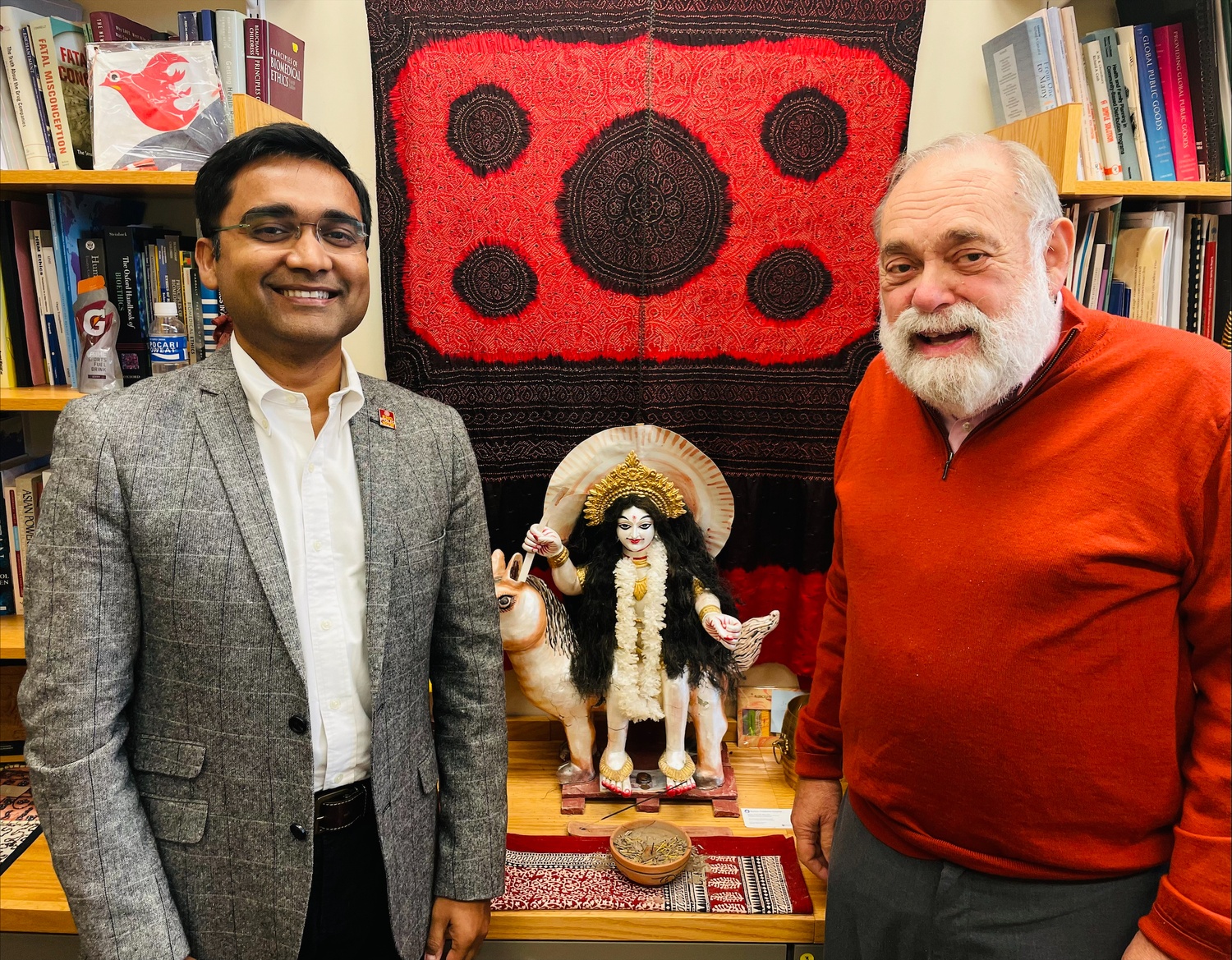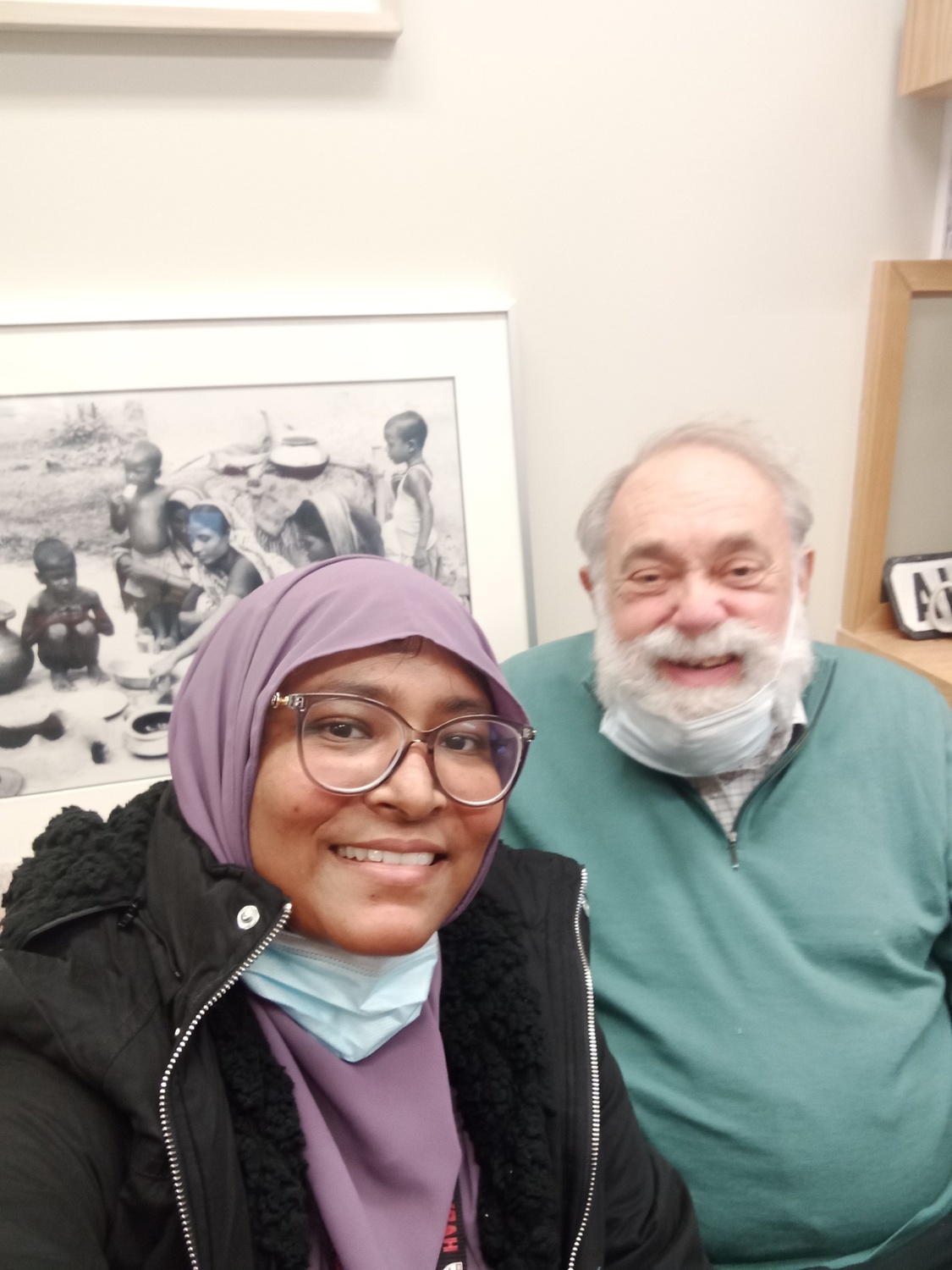Richard A. Cash, Developer of Oral Rehydration Therapy, Dies at 83
Richard A. Cash died on Oct. 22 at his Cambridge home after an eight-month battle with brain cancer. He was 83.
When Qudsia Huda first met her adviser and lifelong mentor, Richard A. Cash, as a graduate student more than 15 years ago, she was surprised that he greeted her in her language, Bengali: “Ami Richard Cash.”
Cash then referred to Bangladesh as his “second home.”
Cash, a senior lecturer on global health at Harvard’s School of Public Health, had learned Bengali while developing oral rehydration therapy, a treatment for cholera that has saved millions of lives.
Cash died on Oct. 22 at his Cambridge home after an eight-month battle with brain cancer. He was 83.
He is survived by his wife, Stella Dupuis.
‘Empathy With the Myriad Poor’
Born and raised in Milwaukee, Cash took his interests in global health across the world.
Cash completed his undergraduate degree at the University of Wisconsin in Madison and received his medical training at the New York University School of Medicine and Bellevue Hospital in New York City before moving to Dhaka, East Pakistan — modern-day Bangladesh — in the late 1960s to work at the Cholera Research Laboratory.
At the CRL, Cash collaborated with David Nalin to develop and implement the use of oral rehydration therapy in the treatment of cholera and other diarrheal diseases. ORT — which replaces traditional IV-based dehydration treatment with a sugar and salt solution — was designed to maximize diarrheal disease survival rates in medically underserved countries.
In the 1970s, Cash helped BRAC, a Bangladesh-based development organization, implement its Oral Therapy Extension Program, which supplied local Bangladeshi residents with the resources and strategies to combat cholera. By showing caregivers how to prepare a simple solution of accessible ingredients, the program disseminated ORT beyond hospital walls in Bangladesh.
Nalin emphasized Cash’s dedication to his work overseas.
“Number one was his empathy with the myriad poor of the developing world, who, at that time, were going totally unserved,” he said.
Despite eventually returning to the United States and taking a post at HSPH, Cash continued to return to Bangladesh and retained a fascination with South Asian culture. Several former students recalled how Cash kept a statue of Sheetala — the Hindu goddess and patron of smallpox eradication — in his office.
Beyond his work at HSPH, Cash was also involved in Harvard’s Lakshmi Mittal and Family South Asia Institute.
Tarun Khanna, faculty director of the Mittal Institute and a professor at Harvard Business School, said Cash “was a frequent participant in many of the research projects and academic events we put on for the community” and served on the academic steering committee.
Cash — who conducted the first scientifically-proven clinical trial of ORT — has been repeatedly honored for his work, winning the Prince Mahidol Award in Public Health in 2006 and James and Sarah Fries Prize for Improving Health in 2011.
Per the World Health Organization, the global dissemination of ORT saved more than 60 million children. The Lancet wrote that ORT “was potentially the most important medical advance this century” in 1978.
‘He Loved Teaching’
Ananda S. Bandyopadhyay, who studied under Cash as a student at HSPH, recalled sitting across from Cash — on opposite sides of the Sheetala statue — to debate combating disease.
“I’ll forever remember this duel that we used to have with the Sheetala in between us and thinking about the eradication programs,” Bandyopadhya said.
“He was such a humble, soft-hearted person, so caring, it would always be reflected in a very genuine way whenever he would interact with students,” he said.
Cash’s students remembered him as not only a brilliant academic, but also someone who tended to his students’ intellectual and personal development.
“Richard’s passion for global health and making a difference in the lives of those who needed it most inspired me and helped shape my career,” Bazghina W.S. Dessalegn, an associate professor at University of Washington and former student at HSPH, wrote in a statement to The Crimson.
“He picked my brains just as he would with a colleague,” Dessalegn added.
Though his work was credited with saving millions of lives through his oral rehydration therapy, “you would never even guess that from knowing him,” said Elizabeth L. Hentschel, a Ph.D. student in the Population Health Sciences program at the Graduate School of Arts and Sciences.
Only months before he died, Cash took on a new class at HSPH just because “he loved teaching,” Hentschel said.
According to Nazia Binte Ali, a Ph.D. student at the HSPH, Cash was “very innovative” in the classroom, promoting a “culture of freedom of speech, sharing ideas and values,” and “motivating students to take the knowledge that is existent and think more in depth.”

In particular, Ramya Pinnamaneni — a research associate at the HSPH — said Cash told his students to focus on “solutions that are actually practical.”
“He always asked us to pay attention to those small things,” Pinnamaneni added. “Which was a very great lesson coming from a person with that experience.”
Timothy Mah, a former HSPH student, wrote in an email that Cash was the kind of teacher “you hope you’re lucky enough to encounter during your education.”
“He was a giant in the world of public health and a caring friend,” Mah wrote.
“I remember that Richard would ask tough questions when you least expected or wanted it, forcing you to re-evaluate your thinking,” Mah added. “Then, he’d just smile because he could see the wheels spinning in your head, knowing you’d be better for it.”
‘Very Human’
Nearly two decades later, Huda — who graduated from HSPH and now serves as the Head of Disaster Risk Management and Resilience Unit at the WHO — still recalled Cash’s support.
When Huda was completing a master’s through the Harvard Humanitarian Initiative — a feat that felt impossible with two young children in tow — she said Cash reminded her that “‘it would be difficult for you, but just keep it in mind that your children will be very proud of you one day.’”
“He was one of those people who would actually not only encourage you, but give you moral support to work for humanity,” she said.
Huda also pointed to Cash’s ability to remember minute details, which “made him very human.”
When the pair met up in Geneva years later, Cash noticed that she was wearing a saree with her winter boots — a quirk of Huda’s from her time at HSPH.
“He was like, ‘But see you still wear boot with your saree,’” Huda said. “Then we started laughing with each other.”
